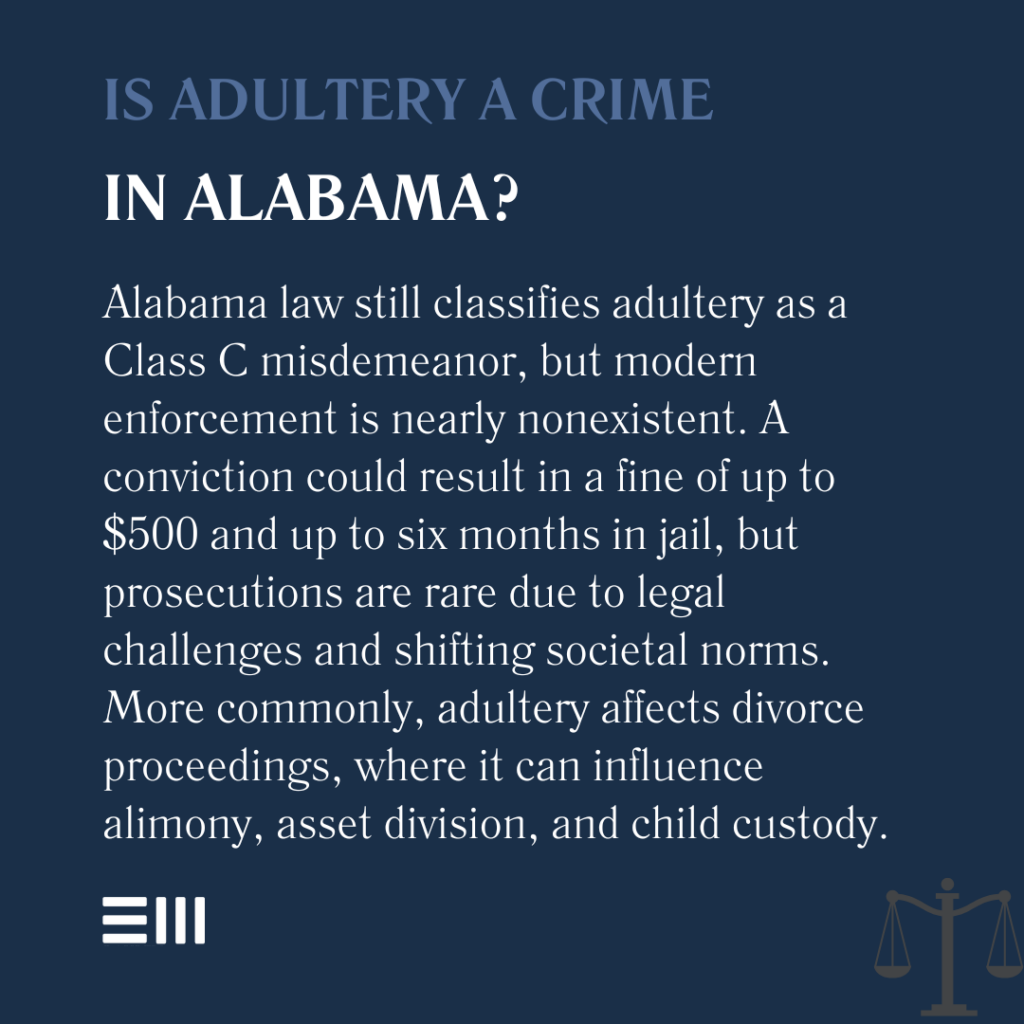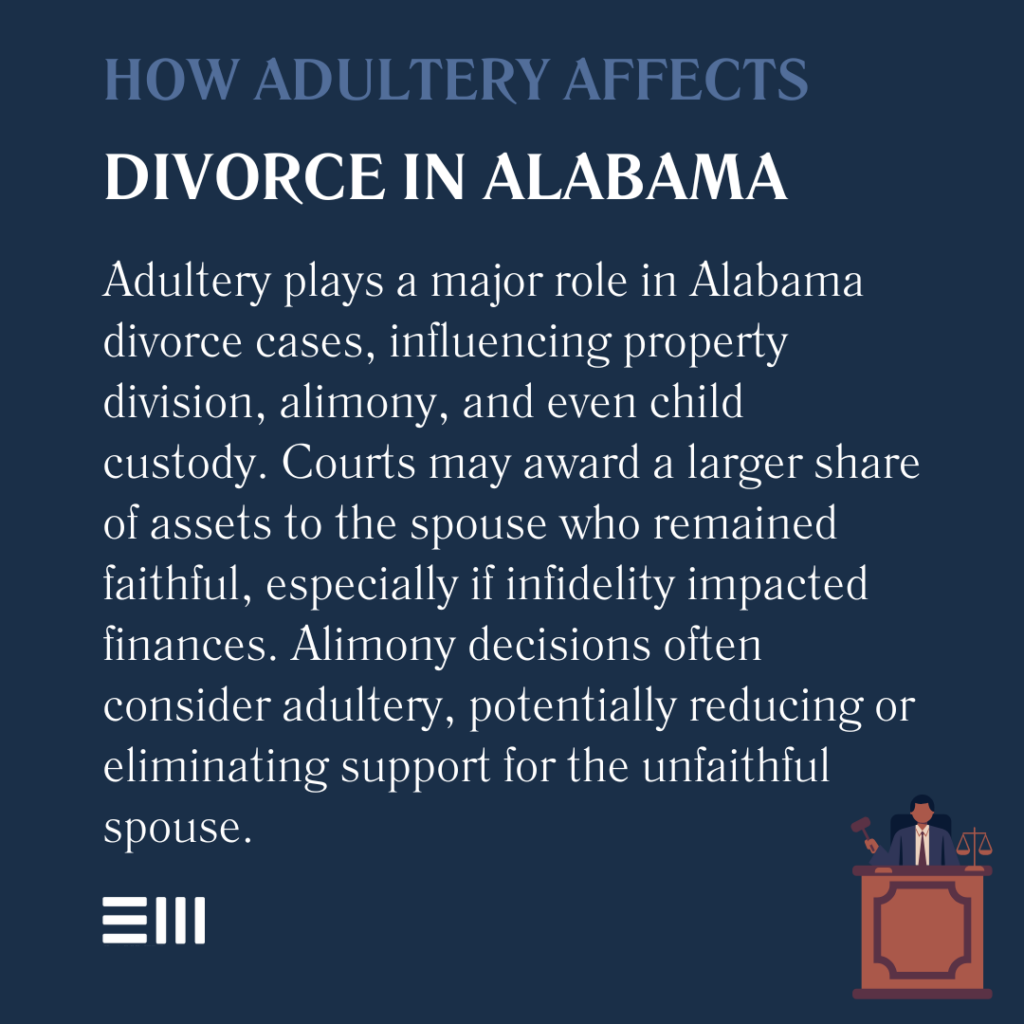
Behind closed doors in courtrooms across Alabama, marriages unravel as evidence of infidelity emerges.
What once remained whispered in private now faces public legal scrutiny, as Alabama’s laws continue to recognize adultery not just as a moral transgression, but as a matter for the courts.
Understanding these laws shapes how judges, attorneys, and families navigate the complex intersection of private relationships and public policy.
The state’s approach to adultery reflects both historical precedent and modern legal realities, creating a unique framework that affects everything from divorce proceedings to criminal statutes.
Legal Definition of Adultery in Alabama
Alabama law maintains specific criteria for what constitutes adultery in legal proceedings.
Understanding these definitions helps individuals navigate potential legal situations and protect their rights under state law.
- Voluntary sexual intercourse with someone other than your spouse;
- Applies to both married parties involved, even if one is unmarried;
- Can occur before physical separation;
- Continues to be relevant until divorce is finalized;
- Intent and consent both factor into legal considerations;
- Electronic communications may provide supporting evidence;
- Pattern of behavior may be considered in legal proceedings;
- Single incidents may qualify under certain circumstances;
- Location of conduct can affect legal implications;
- Timing relative to separation matters;
- Different standards may apply in civil versus criminal contexts; and
- Emotional affairs may factor into some proceedings.
These definitions guide how courts approach adultery cases in various legal contexts, setting the foundation for both civil and criminal proceedings.

Civil Law Implications
Adultery affects multiple aspects of civil law in Alabama, particularly in divorce proceedings.
The courts consider several factors when adultery becomes part of legal proceedings, weighing various elements to ensure fair outcomes.
- Grounds for fault-based divorce with specific timing requirements;
- Impact on property division decisions and asset allocation;
- Influence on alimony determinations and support calculations;
- Effect on child custody arrangements and visitation rights;
- Potential civil lawsuit considerations for alienation of affection;
- Evidence requirements in proceedings vary by jurisdiction;
- Impact on settlement negotiations and mediation processes;
- Timing considerations in legal filings and statute limitations;
- Effect on retirement benefits and pension distributions;
- Insurance policy implications and coverage changes;
- Professional license implications in certain fields;
- Business partnership impacts and valuations;
- Real estate title and transfer considerations;
- Joint account management and division; and
- Credit and debt responsibility allocation.
Understanding these implications helps individuals prepare for potential legal proceedings and protect their interests effectively.
Criminal Law Considerations
While rarely prosecuted, Alabama maintains criminal statutes regarding adultery.
These laws remain on the books and could technically be enforced, though modern application differs significantly from historical practices.
- Class C misdemeanor classification under state law;
- Maximum fine of $500 with potential variations;
- Potential jail time up to 6 months if convicted;
- Statute of limitations considerations for prosecution;
- Prosecution requirements and burden of proof;
- Defense strategies and legal precedents;
- Modern enforcement patterns and frequency;
- Historical context of the law’s development;
- Constitutional challenges and legal tests;
- Jurisdictional issues between courts;
- Law enforcement involvement limitations;
- Prosecutorial discretion factors;
- Impact on professional licenses;
- Interstate enforcement considerations; and
- International travel implications.
These criminal provisions, though seldom enforced, reflect Alabama’s legal stance on marital fidelity and influence other areas of law.
Evidence Requirements
Courts require specific types of evidence to consider adultery allegations in legal proceedings.
Understanding evidence requirements helps prepare for potential legal actions and ensures proper documentation.
- Direct evidence standards and requirements;
- Circumstantial evidence considerations and weight;
- Electronic communication records and authentication;
- Witness testimony requirements and credibility;
- Financial record relevance and documentation;
- Surveillance limitations and legal boundaries;
- Social media documentation and verification;
- Phone records as evidence and access rules;
- Hotel and travel records documentation;
- Private investigator reports and admissibility;
- Credit card statement analysis methods;
- GPS tracking data considerations;
- Security camera footage usage;
- Text message and email recovery; and
- Digital forensics requirements.
Meeting these evidence requirements proves essential for adultery-related legal proceedings and affects case outcomes significantly.
Impact on Divorce Proceedings
Adultery significantly influences how courts handle divorce cases in Alabama.
Several key areas face particular scrutiny when infidelity enters divorce proceedings, affecting both immediate and long-term outcomes.
Property Division Effects:
- Impact on marital asset distribution formulas;
- Treatment of gifts between spouses during marriage;
- Business asset considerations and valuations;
- Retirement account division and timing;
- Real estate allocation and ownership rights;
- Vehicle ownership decisions and transfers;
- Investment account division strategies;
- Debt responsibility assignment methods;
- Family business implications and control;
- Inheritance considerations and protections;
- Professional practice valuations;
- Intellectual property rights;
- Art and collectible divisions;
- Cryptocurrency assets; and
- Hidden asset discovery.
Alimony Considerations:
- Fault impact on support amounts and duration;
- Duration of payments and modification terms;
- Modification possibilities and requirements;
- Tax implications for both parties;
- Rehabilitation support objectives;
- Length of marriage effects on awards;
- Income disparity considerations;
- Standard of living factors analysis;
- Health insurance implications;
- Future earning capacity evaluations;
- Educational support provisions;
- Cost of living adjustments;
- Retirement impact planning;
- Second career considerations; and
- Special needs provisions.
Child Custody Impact:
- Best interest standards application;
- Moral fitness considerations and weight;
- Parenting time arrangements and schedules;
- Supervision requirements and terms;
- Visitation scheduling flexibility;
- New relationship implications;
- Child support calculations methods;
- Educational decision-making authority;
- Religious upbringing concerns;
- Healthcare decisions authority;
- Extracurricular activity choices;
- Travel restrictions consideration;
- Social media usage guidelines;
- Communication protocols; and
- Emergency decision authority.
Understanding how these factors interplay in divorce proceedings helps individuals prepare for potential outcomes and make informed decisions about their legal strategy.

Legal Protection Strategies
Understanding how to protect your legal rights during adultery-related proceedings helps ensure better outcomes.
Several key strategies can help navigate these complex situations.
- Documentation protocols development;
- Asset protection measures;
- Communication guidelines;
- Professional conduct standards;
- Social media management;
- Financial record keeping;
- Witness cooperation plans;
- Privacy protection methods;
- Evidence preservation techniques;
- Legal consultation timing;
- Insurance coverage review;
- Estate plan updates;
- Business interest protection;
- Professional license safeguards; and
- Reputation management.
Taking proactive steps to protect your legal interests through these strategies can significantly impact the outcome of adultery-related proceedings and help preserve your rights throughout the legal process.
Common Questions About Adultery Laws in Alabama
Many individuals seek clarity about how Alabama handles adultery in legal proceedings.
Here are detailed answers to frequently asked questions about adultery laws in Alabama and their implications in various contexts.
How Does Alabama Define Adultery?
The state considers adultery as voluntary sexual intercourse between a married person and someone other than their spouse, requiring specific evidence standards for legal proceedings and considering various factors in its definition.
What Evidence Is Required to Prove Adultery?
Courts require either direct evidence or strong circumstantial evidence that clearly indicates adultery occurred, often including electronic records, witness testimony, or documentation of opportunity and intention. Evidence must meet specific legal standards.
Does Adultery Affect Property Division?
While Alabama courts can consider adultery when dividing marital property, they must also weigh other factors like length of marriage and economic circumstances. The impact varies based on case specifics.
Can Someone Go to Jail for Adultery?
Though technically possible under Alabama law, criminal prosecution for adultery is extremely rare in modern times, with civil consequences being more common and relevant to most cases.
How Does Adultery Impact Child Custody?
Courts primarily consider the best interests of the child, though moral fitness, including adultery, may factor into custody decisions if it affects parenting ability or home environment stability.
What Are the Time Limits for Filing Adultery Claims?
Different statutes of limitations apply to various types of adultery-related claims, affecting both civil and criminal proceedings. Understanding these timeframes is crucial for legal planning.
How Do Courts Handle Digital Evidence?
Electronic communications and digital records must meet specific authentication requirements and relevance standards to be admissible in adultery-related proceedings.
Build Your Legal Protection Plan
Complex legal situations require experienced guidance to navigate effectively.
Whether facing allegations or seeking to protect your rights, understanding the full scope of Alabama’s adultery laws proves essential for making informed decisions about your future.
Contact Baxley Maniscalco today for a confidential consultation about your legal options. Our experienced family law team provides discrete, professional guidance through sensitive legal matters.
Can't find what you're looking for? Search our site below.










